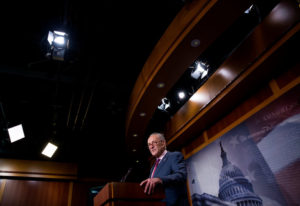WASHINGTON — Congressional lawmakers said on Friday that the collapse of Republican efforts to demolish the Affordable Care Act had created an opening for bipartisan work to shore up health insurance markets and protect consumers against sharp increases in premiums.
But any such effort would have to overcome the firm resistance of President Trump and Republican leaders on Capitol Hill who have refused to participate in any effort to fortify President Barack Obama’s health law.
The professions of a desire for bipartisan cooperation were as profuse on Friday as the short-term outlook for tangible results was grim.
“On health care, I hope we can work together to make the system better in a bipartisan way,” said the Senate Democratic leader, Chuck Schumer of New York, who led efforts to preserve the Affordable Care Act. “And I’m optimistic that that can happen,” he added, saying that he recognized flaws in the law.
The Republicans’ seven-year promise to repeal the Affordable Care Act seemed to come to an end in the early hours of Friday when 51 senators — including three Republicans — blocked a narrow version of repeal that would have rolled back only a few provisions of the sweeping health care law.
Without a Republican majority to approve either a comprehensive replacement for the health law or a repeal-only bill, Republican leaders had fallen back on what they called the lowest common denominator. And that failed, too.
Senator John McCain, Republican of Arizona, who cast the decisive vote against the Republican bill around 1:30 on Friday morning, appealed for a bipartisan approach. “The vote last night presents the Senate with an opportunity to start fresh,” he said.
The Affordable Care Act “was rammed through Congress by Democrats on a strict party-line basis without a single Republican vote,” Mr. McCain said, and Republicans must not make the same mistake.
But there was no hint of an olive branch from the Senate majority leader, Mitch McConnell, who this summer suggested that a failure to repeal the Affordable Care Act would force him to work with Mr. Schumer.
“Bailing out insurance companies with no thought of any kind of reform is not something I want to be part of,” Mr. McConnell said in the early hours of Friday. He suggested that many Democrats secretly wanted a single-payer health care system, with a much larger role for the government.
President Trump reiterated his threat to force the health law to collapse. “3 Republicans and 48 Democrats let the American people down. As I said from the beginning, let ObamaCare implode, then deal. Watch!” he wrote on Twitter.
And some Republicans did not sound ready to close the door on repeal, despite the exceedingly slim hopes of reviving, yet again, an effort that on Friday morning seemed doomed.
“I am disappointed and frustrated, but we should not give up,” said the House speaker, Paul D. Ryan of Wisconsin. “I encourage the Senate to continue working toward a real solution that keeps our promise.”
If a bipartisan coalition can coalesce around changes to the Affordable Care Act, lawmakers see several vehicles to force such proposals to the floors of the House and Senate. Spending bills for the fiscal year that starts Oct. 1 will have to be signed, and the popular Children’s Health Insurance Program will need additional funds.
And the ideas are out there. Democrats want to provide money to insurers to reduce out-of-pocket expenses for poorer consumers, a proposal with some Republican backing. An earlier version of the Senate Republican repeal bill would have continued such cost-sharing payments through December 2019.
Two Democratic senators, Thomas R. Carper of Delaware and Tim Kaine of Virginia, have introduced legislation that would authorize the federal government to help pay the largest health insurance claims through a backstop known as reinsurance. That, they argue, could substantially reduce insurance premiums.
An earlier version of the Senate Republican bill included a similar concept, a $182 billion “state stability and innovation program.” Senators assumed that much of the money would be used for reinsurance arrangements.
Senators of both parties want to help consumers in counties where no insurer offers health plans under the Affordable Care Act marketplace — a real possibility next year as insurers retreat from the health law’s marketplaces.
Senators Lamar Alexander and Bob Corker of Tennessee, both Republicans, want to allow consumers in such counties to use tax credits to buy insurance outside the public marketplace. Senator Claire McCaskill, Democrat of Missouri, would allow them to obtain coverage through the insurance exchange in the District of Columbia, which serves many members of Congress.
Moderates in both parties have been talking behind the scenes, but it is unclear whether they would need or receive permission from their party leaders to cooperate more. Party leaders are continually weighing the implications of health care for next year’s midterm elections.
Mr. Alexander, a former governor who is the chairman of the Senate health committee, is seen as a possible deal maker. He intends to hold hearings on possible solutions to the problems plaguing insurance markets in some states including his own.
Senator Joe Manchin III, Democrat of West Virginia and another former governor, said he saw the Senate’s 11 former governors as a potential source of pragmatic bipartisan solutions.
Senator Susan Collins, Republican of Maine, who voted against repeal, said: “The A.C.A. is flawed and in portions of the country is near collapse. Rather than engaging in partisan exercises, Republicans and Democrats should work together to address these very serious problems.”
new york times

